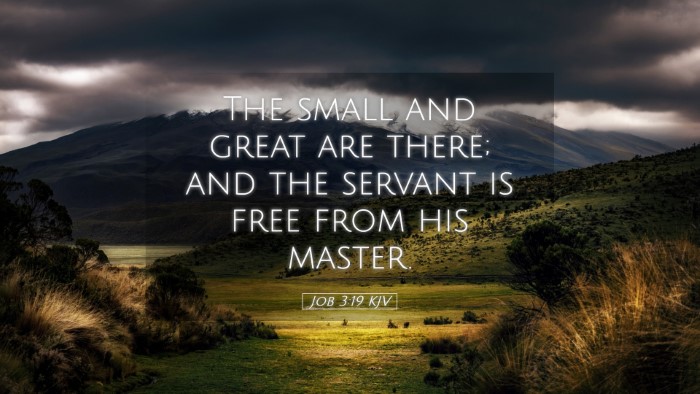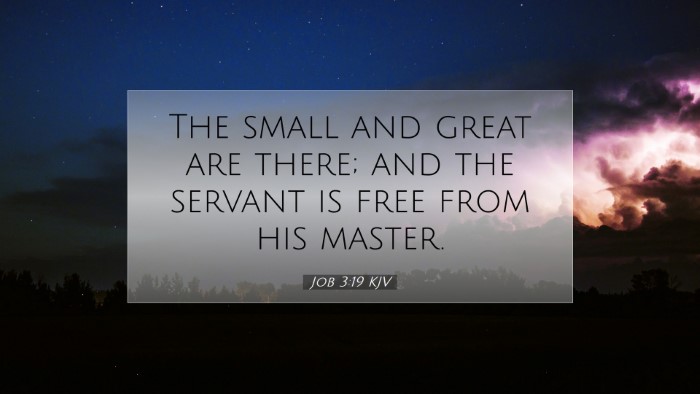Old Testament
Genesis Exodus Leviticus Numbers Deuteronomy Joshua Judges Ruth 1 Samuel 2 Samuel 1 Kings 2 Kings 1 Chronicles 2 Chronicles Ezra Nehemiah Esther Job Psalms Proverbs Ecclesiastes Song of Solomon Isaiah Jeremiah Lamentations Ezekiel Daniel Hosea Joel Amos Obadiah Jonah Micah Nahum Habakkuk Zephaniah Haggai Zechariah MalachiJob 3:19
Job 3:19 KJV
The small and great are there; and the servant is free from his master.
Job 3:19 Bible Commentary
Commentary on Job 3:19
Job 3:19 states:
"The small and great are there; and the servant is free from his master."
Contextual Overview
In this verse, Job laments his birth and expresses his deep sorrow and existential dread after experiencing immense suffering. The preceding chapters provide a backdrop of Job's afflictions, where he is stripped of his wealth, health, and family. The weight of his unbearable pain leads him to curse the day of his birth, yearning for a state of existence devoid of life.
This verse forms part of a broader discourse on the nature of suffering, death, and the equality that all people find in death, regardless of their earthly status.
Theological Insights
Equality in Death
Job's proclamation highlights a profound theological truth: death renders all earthly distinctions meaningless. Both the small and the great, the servant and the master, meet the same end. This concept resonates throughout Scripture, illustrating that, in the eyes of God, worldly status does not define one's worth.
Matthew Henry reflects on this notion, emphasizing that in death, there is no hierarchy. All are equal, stripped of titles and roles, uniting under the same inevitable fate of mortality.
Bitterness and Longing for Relief
Job's words are infused with bitterness, exhibiting a longing for relief from his suffering. He contemplates what it would be like to be dead, suggesting a belief that death might offer an escape from the trials of life. Albert Barnes comments on this deep anguish, noting that Job’s desire to escape from suffering speaks to the universal human struggle with pain and despair.
Literary Analysis
This verse serves as a poignant reflection on mortality. Job uses parallelism to contrast the 'small' and 'great,' effectively summarizing the reality of human existence. Adam Clarke notes that Job employs this literary device to underline the futility of earthly distinctions in the face of death—an observation that invites readers to introspect on their priorities and values during their earthly journey.
Pastoral Applications
- Understanding Suffering: Pastors can use this verse to help congregants understand that suffering is a common human experience. Emphasizing the shared nature of pain can foster community and support among believers.
- Comfort in Mortality: Job’s reflections on death can be a source of comfort for those grieving. Pastoral care can encourage individuals to view death not as an end but as a transition, aligning with broader biblical themes of hope and resurrection.
- Encouraging Humility: This verse challenges our human pride and encourages humility. Pastors can remind their congregations of the transient nature of life and the importance of living in service to others, regardless of social status.
Scholarly Reflections
The existential questions posed by Job invite theologians and scholars to grapple with the nature of suffering and the human condition. The verse's focus on equality in death raises questions about the relevance of status and power.
Many scholars have examined how Job’s lament correlates with the broader narrative of theodicy—the exploration of why the righteous suffer. This verse, in particular, expands the conversation on how individuals perceive their circumstances compared to the divine economy of justice.
Conclusion
Job 3:19 provides a haunting, yet profound commentary on the nature of life, suffering, and equality in death. By incorporating insights from renowned biblical commentaries, we weave a narrative that resonates with the struggles of humanity and the divine truths that underlie them. This commentary stirs reflections on the shared experience of suffering and the comforting reality that in death, all distinctions fade away.


